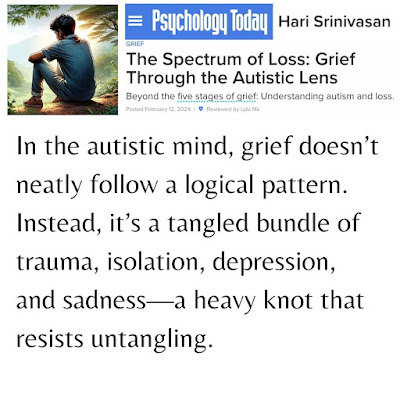Keynote at Duke ACE
Rewind: Interactions with Planet X
Rewinding to something I wrote many years ago in high school.
=====
Interactions with Planet X
Words matter: Reframing neurodivergence in science, medicine and society
How we write and think about neurodiversity can have a profound effect on people’s lives; watch the webinar hosted by Cell Press and The Lancet.
Weak Central Coherence Theory of Autism
Autism Lexicon: Weak Central Coherence (WCC) Theory
The WCC Theory is a cognitive theory of autism (cognitive theories try to explain how autistics think).
It suggests that autistics focus on noticing details but might struggle with seeing the bigger picture. This affects how they see and understand the world around them. This unique way of thinking brings both strengths and challenges, affecting everyday tasks, social interactions, and work or hobbies.
Read about WCC in more detail
-------
Vanderbilt Brain Institute Graduate Student Directory
https://medschool.vanderbilt.edu/brain-institute/about-us/team-directories/#h2-graduate-student-directory
The end of Autism Month
April is Autism Acceptance Month.
On April 30th there is a flood of emails and social media posts - all pointing to the fact that its the last day of autism acceptance month.
Does this mean that autism acceptance is not important for the remaining 11 months? 😔
Last Class at Berkeley
This day 2 years ago.
OMG. My very last undergrad class at Berkeley.
Berkeley Haas Scholars at work.
Shoutout from FCAI on my NSF Award
The NSF GRFP is a tremendous achievement and a testament to Hari's hard work, dedication, and innovative research approach. As a neurodivergent individual, Hari brings a unique perspective to the field of Neuroscience, and his work, with its potential to make a significant impact on the lives of the community, is truly inspiring.
At the Frist Center for Autism and Innovation, we are committed to promoting neurodiversity and providing opportunities for individuals like Hari to flourish in science and engineering. We believe that neurodiversity is a strength, and we are proud to support Hari and other neurodivergent researchers in their quest to make a difference in the world.
On behalf of the Frist Center for Autism and Innovation, we would like to extend our heartfelt congratulations to Hari on this well-deserved honor. We are not just proud, but deeply appreciative of all that he has accomplished and look forward to seeing all the amazing things that he will achieve in the years to come. Hari is an inspiration to us all, and we are grateful to have him as a part of our community.
hashtag#Neurodiversity hashtag#Neurodivergence hashtag#ASD hashtag#Autism hashtag#Strength hashtag#SocialModel hashtag#NSF hashtag#GraduateStudent hashtag#Fellowship hashtag#NationalScienceFoundation hashtag#GraduateFellowship hashtag#Congratulations hashtag#Awards
A kinder ABA is a therapist driving you to the point of frustration, then offering to hold your hand
https://link.springer.com/article/10.1007/s40617-023-00833-w
Good grief is all I can say.
Adding the prefix of "Kind" to something does not automatically make anything automatically Kinder. As is peppering a paper with the word "Kind" to sublimely influence you that it must be kind.
And a sample size of 4 autistics in the study makes this a valid method, how?
And what did this "kind" translate to exactly. when a therapist drives you to the point of a tantrum in the first place, then offers to hold your hand, and saying "I can see you are frustrated."
Is this a new marketing strategy by the (massive-profits with no accountability) ABA industry to make even more profits of desperate families.
Please don't joke around with studies trying to whitewash stuff. This is not helping.
Autism and the Cocktail Party Effect
The "cocktail party effect" refers to the brain's ability to focus one's auditory attention on a particular stimulus while filtering out a range of other stimuli, as when a person can focus on a single conversation in a noisy environment. This ability involves the auditory cortex and other brain regions that manage attention. The term was coined by cognitive scientist Colin Cherry in the 1950s.
For example, at a busy party with multiple conversations happening simultaneously, you are able to listen and respond to one person speaking to you without being distracted by the surrounding noise. This phenomenon highlights our ability to selectively attend to particular sounds in a complex auditory landscape. It's often studied in contexts involving hearing, neuroscience, and psychology, particularly in understanding how attention and the sensory system interact.
In autistics, the cocktail party effect may manifest differently due to variations in auditory processing and attentional focus. Autistics often experience atypical auditory processing, which can mean that separating speech from background noise is more challenging. This difficulty is sometimes referred to as auditory filtering problems with "auditory scene analysis." Research suggests autistic children show diminished performance in tasks requiring them to attend to speech in noisy environments compared to their neurotypical peers (Alcántara et al., 2004). This can contribute to the sensory overload many autistic individuals report in noisy or crowded settings.
These auditory processing differences are an essential consideration in understanding the sensory experiences of autistic individuals and underscore the need for tailored strategies in educational, social, and occupational settings to accommodate their unique sensory profiles.
Versions of this article: Academic/Scientific Audience and PlainSpeak for Lay Reader
Articles on other topics in #PlainSpeak













